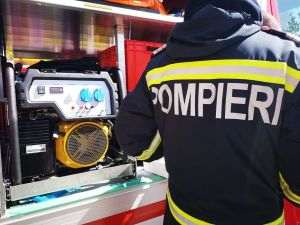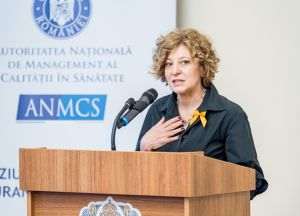Yesterday, in the plenary session in Strasbourg, the European Parliament approved the new European Commission for the 2024-2029 term, led by Ursula von der Leyen. The vote marks a landmark moment for Romania, as Roxana Mînzatu officially becomes Executive Vice-President of the European Commission, responsible for skills, vocational training and human resources management. This is a historic first for Romania, which, 17 years after its accession, is occupying a leadership position at the European Executive level for the first time.
The new European Commission (von der Leyen II Commission) was approved with 370 votes in favour, 282 against and 36 abstentions. Her term of office will begin on 1 December 2024. Ursula von der Leyen presented her team in plenary as a "truly European" one, made up of former government leaders, experts from various fields and local leaders, highlighting its diversity and professionalism. She pointed out that her team is well-suited "for this moment in Europe's history" and called for close cooperation between the European Parliament, the Member States and the European Commission.
In her speech, von der Leyen put particular emphasis on the role of Roxana Mînzatu in the new European Commission. The Executive Vice-President will be tasked with leading European policies related to developing citizens' skills, education and adapting the workforce to the challenges of the future.
Ursula von der Leyen said: "People are the foundation of our economy. Their hard work, talent and skills are the key to our competitiveness. Today's competitiveness depends less on the cost of labour and more on the knowledge and training of workers. That is why I have appointed Roxana Mînzatu as Executive Vice-President to lead our efforts on skills and training."
She underlined that Mînzatu's mandate will focus on improving working conditions, fair wages, work-life balance, access to education and decent housing, all of which are essential pillars of Europe's social market economy.
• Competitiveness Compass: a strategy for Europe's economic future
Another key point on the new Commission's agenda is the launch of the "Competitiveness Compass", an initiative that will guide the European Union's economic transformation. It is based on three main pillars:
- Closing the innovation gap with the US and China - a commitment to positioning Europe as a global leader in technology and innovation.
- Decarbonisation in synergy with competitiveness - supporting the green transition, without sacrificing jobs or economic development.
- Energy security - reducing dependence on external resources and investing in clean energy.
Von der Leyen highlighted that the transition to a green economy must be achieved "with industry, not against it" and that the first major project of the new Commission will be the "Clean Industry Deal", which will be proposed in the first 100 days of her mandate.
The President of the European Commission placed European defence on her priority agenda, advocating for a significant increase in spending in this area.
"EU defence spending must increase. We need a single market for defence, a strengthened defence industrial base and joint European projects in this area. In the first 100 days, we will present a White Paper on the future of European defence", announced von der Leyen.
She highlighted that Dan Jorgensen and Andrius Kubilius will coordinate measures to reduce energy costs, promote clean energy and support SMEs involved in the defence industry. She also reiterated the EU's commitment to working closely with NATO to address the security challenges posed by the war in Ukraine and other regional conflicts.
Regarding the automotive industry, the Commission President announced the creation of a Strategic Dialogue for the Future of the Automotive Industry in Europe.
"This industry is a source of European pride. Millions of jobs depend on it and we must ensure that the future of cars continues to be built in Europe," she said, noting that Apostolos Tzitzikostas, Commissioner for Transport and Tourism, will play a key role in this effort.
• Reactions of Romanian MEPs
Romanian MEPs welcomed the decision to validate the new European Commission, but also raised national priorities.
Siegfried Mureşan, Vice-President of the European People's Party (PNL/EPP), said: "We will work together, as the European Parliament, with the new members of the European Commission. We will take Europe forward, we will deliver, we will build. I heard what the people said in the European elections. People, on June 9, said they want a Europe that to protect them, which focuses on security, on defense, on protecting our borders. We will build a Europe that is more competitive, with a stronger economy because competitiveness means secure jobs, which guarantees higher social standards in Europe. (...) We will have a budget that will be clearly aligned in the coming years with the priorities of the European Union: safety, security, competitiveness, agriculture and supporting neighboring states. A budget that is simpler, easier, less bureaucratic, a budget that is in line with our values. Whoever wants to receive European funds must respect European values, the rule of law. A budget is an essential tool to help citizens in good times, but also in times of crisis, and we will support you with a large pro-European majority".
Dan Nica (PSD/S&D) said: "The Romanian delegation from the S&D group will vote for the College of Commissioners today, because we believe in a strong and united Europe, but it is not a blank vote; it is a conditional vote, based on some clear, precise and important criteria". Nica mentioned the need to promote a social Europe, ensure affordable energy bills for citizens and support a competitive European industry, capable of providing well-paid jobs.
Furthermore, Nica made a direct appeal to the President of the European Commission, Ursula von der Leyen, to investigate possible foreign interference in the first round of the presidential elections in Romania, which took place last Sunday: "We want to know who brutally and grossly interfered in the presidential elections in Romania, who are those foreign entities, who are those companies that bought for a lot of money and brutally influenced democracy. This intervention by you and the College of Commissioners must show that in the EU, in Romania, democracy cannot be bought and we want to know who were those who gave money, because we know those who took it, TikTok, Facebook and Instagram took it. Because if the toughest measures are not taken now for those who violated European laws, national laws, it means that in the EU anything and anytime can be bought, and democracy must never be for sale".
In his intervention, Dan Barna (USR/Renew Europe) also referred to the same topic, the presidential elections, and said: "The time has come to start meeting expectations and delivering results. Now, not in two years or five years. I demand from this Parliament a real concern for the rule of law, a strict and clear application of the legislation on social networks, tougher mechanisms to combat disinformation and more effective measures to respond to the hybrid warfare that is increasingly coming upon us. Otherwise, democratic elections as we know them and want them in Europe could become history. We are a Union of people, not algorithms. So I ask this Commission to make an operation like the one in last Sunday's elections in Romania no longer possible. We must act now.
MEP Gheorghe Piperea (AUR/ECR) harshly criticized the European Commission and announced that he would not vote for the investiture. Gheorghe Piperea said: "In this very Parliament, Mrs von der Leyen made a statement in July, uttering a cliche: we will leave no one behind. This would mean that von der Leyen would take care of the Romanian citizens living on the edge of poverty. In 2019, the European poor numbered 100 million, and in 2023, 102 million. 6.5 million are Romanian citizens. The mirage of climate change, war, the business of pharmaceutical, banking and technology companies, including useless vaccines, with the emblematic Pfizergate at the forefront, mattered more. The new college of commissioners has reserved a special trend for the EU's neo-feudal elite. Ordinary citizens will be left on the platform. That is why my vote is against the inauguration of this Commission".
It is certain that, after the positive vote received yesterday from the majority in the European Parliament, the new European Commission must transform the European Union into a global leader in areas such as innovation, the green transition and European security. Roxana Mînzatu, in her capacity as Executive Vice President, will play a central role in defining people-centered policies, education and vocational training, while strengthening Romania's position in the European decision-making architecture.
















































